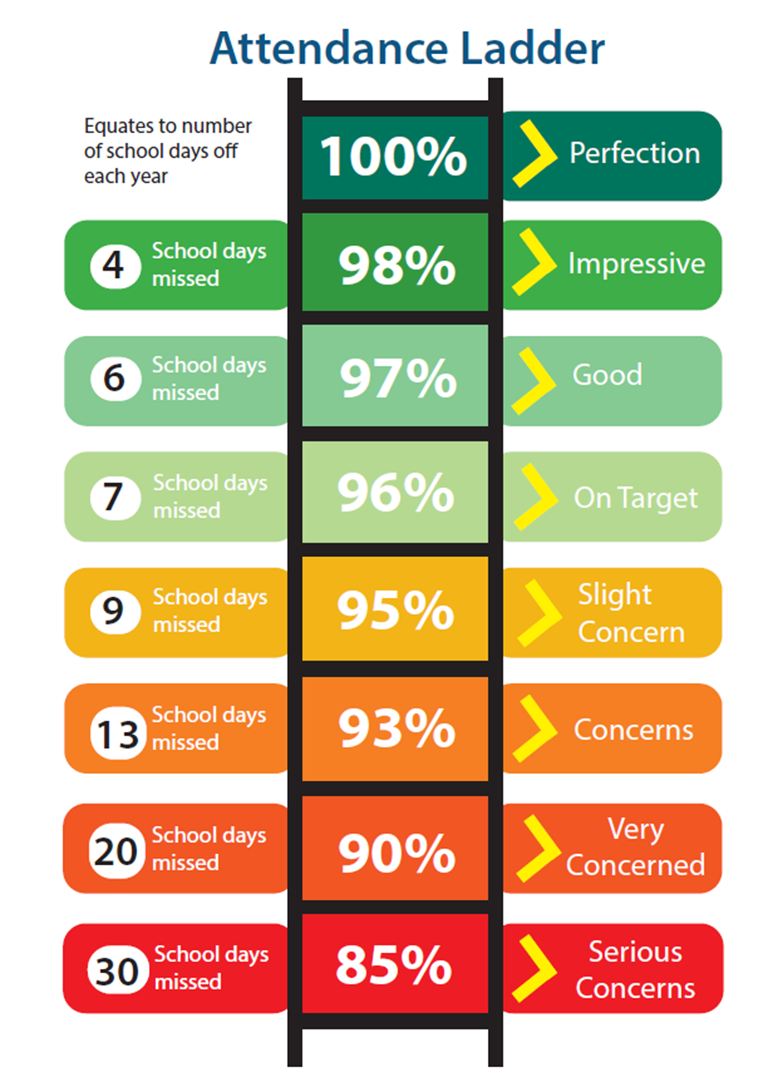Attendance and Punctuality
 Maintaining high attendance is important, not just for your child’s learning, but also for their overall wellbeing, wider development and their mental health. Children who habitually have good attendance are best placed to flourish, reach their potential and live life in all its fullness. There will be the same expectation for them when they move onto secondary school and into their future careers.
Maintaining high attendance is important, not just for your child’s learning, but also for their overall wellbeing, wider development and their mental health. Children who habitually have good attendance are best placed to flourish, reach their potential and live life in all its fullness. There will be the same expectation for them when they move onto secondary school and into their future careers.
It can be difficult to know when to keep your child off school when they appear unwell. Please see the guidance below from the NHS on school attendance if you feel your child is unwell. If you child is unwell at the start of the day and then improves across the morning, please bring them into school for the afternoon.
Many parents will at some point be faced with a child not wanting to go to school. If you are having difficulties getting your child to school, please view our family guides with a range of suggested strategies. Make sure that you give your strategies time to work.
We have high expectations for every pupils attendance. Our ‘floor target’ is 96% but we hope for 100% attendance. The following table shows the impact on school attendance based on the number of days off:
Punctuality
What difference will it make if my child is late to school?
When pupils arrive late, they miss out on essential instructions given at the beginning of the lesson. This can significantly reduce achievement, regardless of academic ability. Children may also feel awkward arriving to the classroom when everyone else is settled. Furthermore, when one pupil arrives late, it disrupts the entire class and the teacher. Therefore, everyone’s education is compromised. Lost minutes means lost learning.
Absence During Term Time
The school is unable to authorise absence unless there are exceptional circumstances. Exceptional circumstances include, for example, occasions where the timing of an event is outside of your control, such as a family wedding or funeral. Exceptional circumstances are events that are not going to occur again. In the overwhelming majority of cases, family holidays do not meet this criteria.
If there are exceptional circumstances, parents may be asked to meet with the Headteacher, or write, giving a full explanation of the exceptional circumstances and provide evidence to support your application. The Headteacher will then write to you to tell you whether the absence can be authorised.
As a school we are working extremely hard to improve the educational experience for children in our school and to maximise their progress and learning. We ask that you continue to support us by ensuring that your children are in school during term time.
Requests for Absence from School in Exceptional Circumstances and Penalty Notices
You are required under the Education Act (1996) to ensure your child attends school regularly. If your child accrues 10 consecutive sessions of unauthorised absence you may be liable for a penalty notice (one days absence equals two sessions and a five day absence is equal to 10 sessions).
An unauthorised absence is any absence that the Headteacher has not given permission for or where an explanation has not been provided by the parents.
Parents must complete a request for absence from school in exceptional circumstances form and submit this to the school, allowing for sufficient time to enable the school to consider the request and inform parents of the decision.
Where parents do not follow the school’s procedures of submitting a request and simply remove their child without seeking prior approval, a warning may not be given and you may be liable for a penalty notice.
If your request is declined or you do not follow the correct procedure and you still take your child out of school the Legal Interventions Team at East Sussex County Council will be notified. The Penalty Notice will be £160 if paid within 28 days reducing to £80 if paid within 21 days. If after 28 days it remains unpaid you may be summonsed to appear before Magistrates to explain why your child has unauthorised school absences and you may be liable for a fine of up to £1000.










